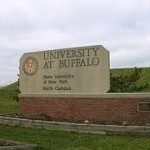State University of New York at Buffalo is shutting down a research institute opened seven months ago to study natural-gas fracking after potential conflicts of interest raised what the college’s president called a “cloud of uncertainty” over its work.
The Shale Resources and Society Institute is closed effective immediately, university President Satish Tripathi said yesterday in a statement. The Public Accountability Initiative, a Buffalo nonprofit that says it focuses on corruption in business and government, said the insitute’s only report in April contained errors and didn’t acknowledge “extensive ties” by its authors to the gas industry.
“Conflicts — both actual and perceived — can arise between sources of research funding and expectations of independence when reporting research results,” Tripathi said in an open letter to the university community. “This, in turn, impacted the appearance of independence and integrity of the institute’s research.”
“Research of such considerable societal importance and impact cannot be effectively conducted with a cloud of uncertainty over its work,” Tripathi said.
The move follows a decision last month by a gas industry group to cancel a Pennsylvania State University study of fracking after some faculty members balked at the project that had drawn criticism for being slanted toward industry. Drilling companies, amid criticism that producing gas by fracking damages the environment, are funding university research that at times reaches conclusions that counter the concerns of critics, Bloomberg News reported in July.
Treated Water
In fracking, millions of gallons of chemically treated water and sand are forced underground to break shale rock and free trapped gas. The technology has lowered energy prices, created jobs, and enhanced national security, according to a task force formed by President Barack Obama’s Energy Secretary Steven Chu.
Critics say fracking has been linked to groundwater contamination in Pennsylvania, high ozone levels in Wyoming and to headaches, sore throats and difficulty breathing for people living close to wells in Colorado. Burying wastewater from drilling has been linked to earthquakes in Ohio, Arkansas and other states.
In May, the Shale Resources and Society Institute found that drillers in Pennsylvania had reduced by half the rate of blowouts, spills and water contamination since 2008. Potential environmental problems could be “entirely avoided or mitigated” under New York’s proposed rules, according to the institutes’s report.
Petroleum Institute
The lead author was Tim Considine a professor of economics in the School of Energy Resources at the University of Wyoming who in the past has worked for groups such as the American Petroleum Institute and the Wyoming Mining Association. The Buffalo report, which identifies Considine by his title at the University of Wyoming, doesn’t disclose his prior work for industry groups.
“In my opinion, it was overblown,” Considine said of the reaction to the SUNY report in an interview in June. “A lot of it is used to deter from the central message of the report, and that is shale gas drilling, hydraulic fracturing in particular, can be regulated so that it doesn’t pose any significant risk for the public and the environment.”
Considine did not respond yesterday to a request for comment on SUNY’s decision to close the institute.
The institute was actively seeking corporate sponsors for a “landmark effort to leverage the safe, sustainable, economic development of shale gas,” according to a document Kevin Connor, director of the Public Accountability Initiative, downloaded from the group’s website.
`Strong Message’
Closing the institute “Does send a strong message to the oil and gas industry that our universities are not for sale,” Connor said in an interview yesterday.
A group of 83 professors and staff at the university in Buffalo in August requested documents on the founding and funding of the shale institute. The SUNY Board of Trustees is reviewing a report from the university on the research group.
“Given the questions that continue to surround the Shale Resources and Society Institute, SUNY Administration and the Board of Trustees support the University of Buffalo’s decision to close it,” according to a statement from the board. “The Board and SUNY reserve further comment at this time while the Board completes its formal review.”
Considine also co-wrote an annual study on fracking for Penn State funded by the Marcellus Shale Coalition, a Pittsburgh-based industry group. The study, which began in 2009, was canceled in October after some faculty members declined to take part.
The reporter on this Bloomberg News story: Jim Efstathiou Jr. in New York.

